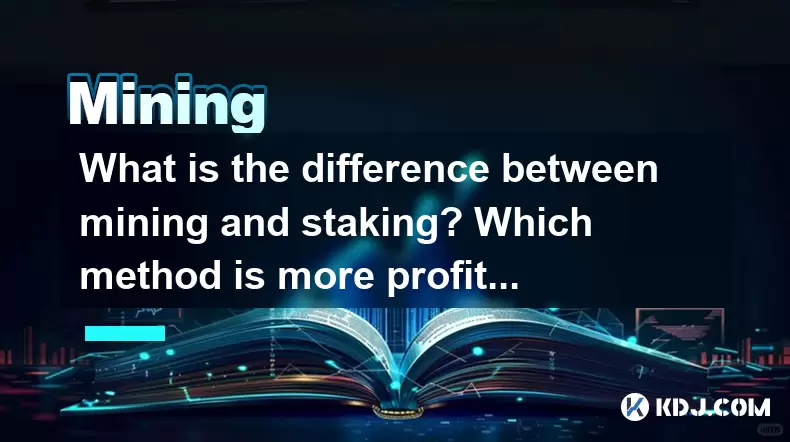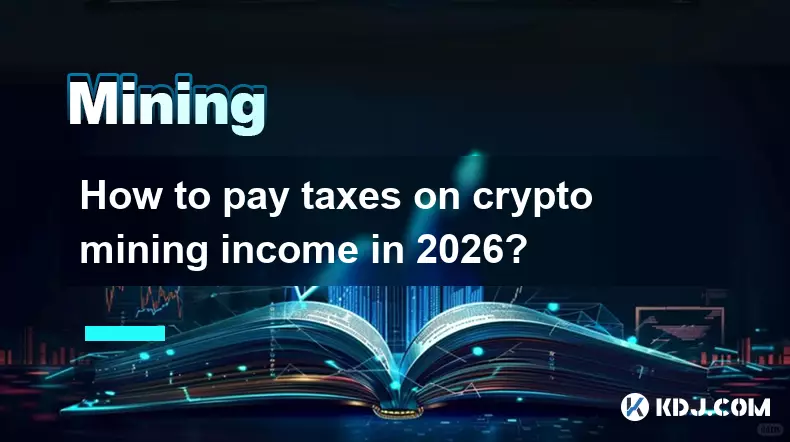-
 bitcoin
bitcoin $87959.907984 USD
1.34% -
 ethereum
ethereum $2920.497338 USD
3.04% -
 tether
tether $0.999775 USD
0.00% -
 xrp
xrp $2.237324 USD
8.12% -
 bnb
bnb $860.243768 USD
0.90% -
 solana
solana $138.089498 USD
5.43% -
 usd-coin
usd-coin $0.999807 USD
0.01% -
 tron
tron $0.272801 USD
-1.53% -
 dogecoin
dogecoin $0.150904 USD
2.96% -
 cardano
cardano $0.421635 USD
1.97% -
 hyperliquid
hyperliquid $32.152445 USD
2.23% -
 bitcoin-cash
bitcoin-cash $533.301069 USD
-1.94% -
 chainlink
chainlink $12.953417 USD
2.68% -
 unus-sed-leo
unus-sed-leo $9.535951 USD
0.73% -
 zcash
zcash $521.483386 USD
-2.87%
광업과 스테이 킹의 차이점은 무엇입니까? 어떤 방법이 더 수익성이 있습니까?
Mining uses energy-intensive hardware to solve problems and add blocks to PoW blockchains, while staking involves locking up cryptocurrency to validate transactions on PoS networks.
2025/05/10 16:07

광업 및 스테이크는 Cryptocurrency 생태계 내에서 블록 체인 네트워크에 참여하고 안전하게 보상하는 동시에 보상을받는 데 사용되는 두 가지 다른 방법입니다. 두 방법 모두 트랜잭션을 검증하고 블록 체인에 추가하는 것을 목표로하지만 다른 원칙으로 작동하며 다른 요구 사항이 있습니다. 이 기사에서는 광업과 스테이 킹의 차이점을 탐색하고 어떤 방법이 더 수익성이 있는지에 대해 논의 할 것입니다.
광업은 어떻게 작동합니까?
채굴은 주로 Bitcoin 및 이더 리움과 같은 작업 증명 (POW) 블록 체인 (스테이크 증명으로 전환하기 전에)에 사용되는 프로세스입니다. 광부는 전문 하드웨어를 사용하여 복잡한 수학적 문제를 해결합니다. 문제를 해결 한 첫 번째 광부는 블록 체인에 새로운 트랜잭션 블록을 추가 할 수 있으며 새로 힌트 된 암호 화폐 및 거래 수수료로 보상을받습니다.
- 하드웨어 요구 사항 : 광부는 광업을 위해 특별히 설계된 ASIC (Application-Specific Integrated Circuits), 종종 ASIC (Application-Specific Integrated Circuits)가 필요합니다.
- 에너지 소비 : 채굴은 문제를 해결하는 데 필요한 계산 능력 때문에 에너지 집약적입니다.
- 탈 중앙화 : 마이닝 프로세스는 필요한 하드웨어가있는 사람이 누구나 참여할 수 있으므로 네트워크의 탈 중앙화를 유지하는 데 도움이됩니다.
스테이 킹은 어떻게 작동합니까?
반면에 스테이 킹은 업그레이드 후 이더 리움 및 Cardano 및 Tezos와 같은 다른 암호 화폐와 같은 스테이크 증명 (POS) 블록 체인에 사용됩니다. 수학적 문제를 해결하는 대신 POS 시스템의 참가자는 일정량의 암호 화폐를 스테이크로 고정시킵니다. 그런 다음 트랜잭션을 검증하고 암호 화폐의 양에 따라 새로운 블록을 만들고 때로는 스테이크를 보유한 시간과 같은 다른 요소에 따라 새로운 블록을 만듭니다.
- 하드웨어 요구 사항 : 스테이 킹에는 일반적으로 덜 전문화 된 하드웨어가 필요합니다. 종종 일반 컴퓨터 나 스마트 폰을 사용할 수 있습니다.
- 에너지 소비 : 스테이 킹은 광업보다 에너지 집약이 훨씬 적으므로보다 환경 친화적 인 옵션이됩니다.
- 탈 중앙화 : 스테이 킹은 또한 네트워크의 탈 중앙화에 기여할 수 있지만, 더 큰 스테이크를 가진 사람들을 선호하는 것으로 종종 비판을받습니다.
광업 및 스테이 킹의 수익성 비교
어떤 방법이 더 수익성이 높은지 결정하는 것은 특정 암호 화폐, 하드웨어 및 전기 비용 및 시장 조건을 포함한 여러 요인에 따라 다릅니다.
- 초기 투자 : 채굴 에는 하드웨어에 대한 초기 투자가 필요하며 비용이 많이들 수 있습니다. 주로 암호 화폐를 유지해야하므로 스테이 킹은 일반적으로 선불 투자가 필요합니다.
- 지속적인 비용 : 광업은 전기 소비로 인해 지속적인 비용이 많이 듭니다. 스테이 킹은 지속적인 비용이 최소화되며, 주로 암호 화폐를 잠그는 기회 비용과 관련이 있습니다.
- 보상 구조 : 광업 보상은 종종 예측 가능하지만 네트워크의 어려움에 따라 변동 할 수 있습니다. 스테이 킹 보상은 스테이 된 금액과 블록 체인의 특정 규칙에 따라 다를 수 있습니다.
수익성에 영향을 미치는 요인
몇 가지 요인이 광업 및 스테이 킹의 수익성에 영향을 줄 수 있습니다.
- cryptocurrency 가격 : 채굴중인 암호 화폐의 가치 또는 스테이 킹은 직접 이익에 영향을 미칩니다. 가격이 상승하면 보상이 더 가치가 있습니다.
- 네트워크 난이도 : 광업의 경우 수학적 문제를 해결하기가 어려워 보상 빈도가 줄어 듭니다. 스테이 킹의 경우 참가자 수와 총 금액은 거래를 검증하기 위해 선택 될 가능성에 영향을 줄 수 있습니다.
- 규제 환경 : 규정의 변화는 운영 비용 또는 활동의 합법성에 영향을 미쳐 채굴과 스테이 킹의 수익성에 영향을 줄 수 있습니다.
광부 및 스테이터를위한 실질적인 고려 사항
광업이나 스테이 킹을 통해 cryptocurrency의 세계에 들어가는 것을 고려하는 사람들에게는 실질적인 단계가 있습니다.
광부 :
- 연구 : 광업 알고리즘 및 필요한 하드웨어를 포함하여 광산을 원하는 특정 암호 화폐를 이해하십시오.
- 하드웨어 획득 : 필요한 마이닝 하드웨어를 구매 또는 대여하여 광산을 원하는 암호 화폐와 호환되도록하십시오.
- 설정 : 마이닝 소프트웨어를 설치하고 마이닝 풀 또는 블록 체인 네트워크에 직접 연결하도록 구성하십시오.
- 유지 보수 : 최적의 성능과 수명을 보장하기 위해 채굴 장비를 정기적으로 모니터링하고 유지 관리합니다.
Stakers의 경우 :
- cryptocurrency를 선택하십시오 : 스테이 킹을 지원하고 투자 목표와 일치하는 cryptocurrency를 선택하십시오.
- cryptocurrency 획득 : 필요한 양의 cryptocurrency를 구매할 수 있습니다.
- 스테이 킹 방법 선택 : 블록 체인에 직접 스테이크를할지 여부를 결정하거나 스테이 킹 풀을 사용하거나 Cryptocurrency 교환에서 제공하는 스테이 킹 서비스를 사용하십시오.
- 스테이 킹 설정 : 선택한 방법에 대한 특정 지침을 따르십시오.이 방법은 지갑에 암호 화폐를 잠그거나 스테이 킹 풀로 옮길 수 있습니다.
위험과 도전
광업과 스테이 킹은 모두 자체 위험과 과제를 제공합니다.
- 광업 위험 : 초기 투자가 높고 지속적인 비용은 진입의 장벽이 될 수 있습니다. 또한, 광업 기술의 빠른 발전으로 인해 하드웨어가 빠르게 사용되지 않을 수 있습니다.
- 스테이 킹 위험 : 주요 위험은 거래를 올바르게 검증하지 못하면 스테이크의 일부를 잃을 수있는 슬래시의 잠재력입니다. 또한, staked 거친 암호 화폐의 가치는 변동하여 전체 수익에 영향을 줄 수 있습니다.
자주 묻는 질문
Q : 광업과 스테이 킹 사이를 전환 할 수 있습니까?
A : 그렇습니다. 광업과 스테이 킹 사이를 전환 할 수는 있지만 관심있는 특정 암호 화폐에 따라 다릅니다. 일부 암호 화폐는 개발의 다른 단계에서 채굴과 스테이 킹을 지원하는 반면, 다른 암호화는 엄격하게 하나 또는 다른 단계입니다. 채굴에 필요한 하드웨어 또는 스테이 킹에 필요한 양의 암호 화폐를 획득하고 각 설정 프로세스를 따라야합니다.
Q : 동시에 광산과 스테이크가 가능합니까?
A : 그렇습니다. 자원이 있다면 동시에 광산과 스테이크가 가능합니다. 두 활동을 개별적으로 관리해야하므로 각각에 필요한 하드웨어 및 암호 화폐가 있는지 확인해야합니다. 그러나 이는 복잡 할 수 있으며 수익성을 극대화하기 위해 신중한 관리가 필요합니다.
Q : cryptocurrency가 채굴이나 스테이킹에 더 적합한 지 어떻게 알 수 있습니까?
A : cryptocurrency가 광업이나 스테이 킹에 더 적합한 지 확인하려면 합의 메커니즘을 연구해야합니다. 작업 증명 (POW)을 사용하는 경우 채굴 용으로 설계되었습니다. 스테이크 증명 (POS)을 사용하는 경우 스테이 킹을 위해 설계되었습니다. 또한 Cryptocurrency의 시장 위치, 향후 업그레이드 가능성 및 선택한 방법에 대한 커뮤니티 지원과 같은 요소를 고려하십시오.
Q : 채굴이나 스테이킹 시점에 대해 알아야 할 법적 고려 사항이 있습니까?
A : 그렇습니다. 채굴 또는 스테이 킹 시점을 알고 있어야 할 법적 고려 사항이 있습니다. 규정은 국가마다 다를 수 있으며 광업 및 스테이 킹의 합법성, 보상 과세 및보고 요구 사항에 영향을 줄 수 있습니다. 법적 문제를 피하기 위해 관할권의 법률을 연구하고 준수하는 것이 중요합니다.
부인 성명:info@kdj.com
제공된 정보는 거래 조언이 아닙니다. kdj.com은 이 기사에 제공된 정보를 기반으로 이루어진 투자에 대해 어떠한 책임도 지지 않습니다. 암호화폐는 변동성이 매우 높으므로 철저한 조사 후 신중하게 투자하는 것이 좋습니다!
본 웹사이트에 사용된 내용이 귀하의 저작권을 침해한다고 판단되는 경우, 즉시 당사(info@kdj.com)로 연락주시면 즉시 삭제하도록 하겠습니다.
- 로얄 조폐국 50p 동전: 피터 래빗 스파크의 광란 수집 희귀 목록(및 주의)
- 2026-02-08 22:30:02
- 2026년 전환점의 시장: 변동성 탐색 및 내러티브 전환
- 2026-02-08 22:15:01
- 비트코인의 빅 딥: 암호화폐 시장의 최신 변동성 파도 탐색
- 2026-02-08 22:10:02
- RWA 요트 헌장, 공해에 진출: 토큰화된 럭셔리를 통한 요트 부두 혁신 투자
- 2026-02-08 22:20:02
- 비트코인 채굴 난이도는 가격 폭락과 미국 폭풍으로 인해 중국 금지 이후 최대 하락폭으로 11% 급락했습니다.
- 2026-02-08 22:00:01
- 주의하세요, 역사를 좋아하는 분들! 슈퍼볼 동전 던지기, 프랭클린 연료의 Libertas Americana 뒤집기, Gridiron Glory와 Colonial Cool 결합
- 2026-02-08 22:00:01
관련 지식

2026년에 암호화폐를 지속 가능하게 채굴하는 방법은 무엇입니까?
2026-02-07 16:20:16
에너지원 최적화 1. 광부들은 낮 시간 동안 ASIC 장비에 전력을 공급하기 위해 창고 옥상에 태양 전지판을 직접 설치하는 경우가 점점 더 늘어나고 있습니다. 2. 아이슬란드와 케냐의 지열 에너지 계약은 현재 선별된 채굴장 운영 해시파워의 68% 이상을 공급하고 있습니...

표준 게임용 노트북에서 Conflux를 채굴하는 방법은 무엇입니까?
2026-02-07 04:19:35
Conflux Mining을 위한 하드웨어 요구 사항 1. Conflux는 ASIC 내성 및 GPU 친화적으로 설계된 Tree-Graph라는 작업 증명 합의 메커니즘을 사용합니다. NVIDIA GTX 1660 Ti 이상이 탑재된 표준 게이밍 노트북은 기술적으로 채굴에 ...

클라우드 마이닝 플랫폼에서 해싱 파워를 구매하는 방법은 무엇입니까?
2026-02-08 17:59:48
클라우드 마이닝 계약 이해 1. 클라우드 마이닝 플랫폼은 사용자에게 물리적 하드웨어를 소유하거나 유지 관리하지 않고도 해싱 파워를 임대할 수 있는 기능을 제공합니다. 2. 계약은 일반적으로 기간, 해시율 단위(예: 10TH/s), 알고리즘 호환성(SHA-256, Scr...

30 시리즈 Nvidia GPU로 Flux를 채굴하는 방법은 무엇입니까?
2026-02-07 14:40:08
시장 변동성 패턴 1. Bitcoin 가격 변동은 유동성이 낮은 기간, 특히 UTC 02:00에서 06:00 사이에 5%를 초과하는 급격한 장중 변동을 보이는 경우가 많습니다. 2. 이더리움과 BTC의 상관관계는 지난 18개월 동안 평균 0.87이었습니다. 이는 ETH...

2026년 암호화폐 채굴 소득에 대한 세금은 어떻게 납부하나요?
2026-02-07 01:20:23
채굴 보상의 세금 분류 1. 채굴 보상으로 받은 암호화폐는 미국, 캐나다, 영국을 포함한 대부분의 주요 조세 관할권에서 경상 소득으로 처리됩니다. 2. 채굴자의 지갑에 입금되는 시점의 코인의 공정한 시장 가치에 따라 과세 금액이 결정됩니다. 3. 이 평가는 신뢰할 수 ...

BTC에 대한 최저 수수료 마이닝 풀을 찾는 방법은 무엇입니까?
2026-02-07 13:00:27
수수료 구조 투명성 1. 가장 평판이 좋은 BTC 채굴 풀은 공식 웹사이트에 직접 수수료 일정을 게시합니다. 종종 "가격", "수수료" 또는 "채굴 조건"이라는 섹션 아래에 게시합니다. 이 페이지에는 블록 보상에서 ...

2026년에 암호화폐를 지속 가능하게 채굴하는 방법은 무엇입니까?
2026-02-07 16:20:16
에너지원 최적화 1. 광부들은 낮 시간 동안 ASIC 장비에 전력을 공급하기 위해 창고 옥상에 태양 전지판을 직접 설치하는 경우가 점점 더 늘어나고 있습니다. 2. 아이슬란드와 케냐의 지열 에너지 계약은 현재 선별된 채굴장 운영 해시파워의 68% 이상을 공급하고 있습니...

표준 게임용 노트북에서 Conflux를 채굴하는 방법은 무엇입니까?
2026-02-07 04:19:35
Conflux Mining을 위한 하드웨어 요구 사항 1. Conflux는 ASIC 내성 및 GPU 친화적으로 설계된 Tree-Graph라는 작업 증명 합의 메커니즘을 사용합니다. NVIDIA GTX 1660 Ti 이상이 탑재된 표준 게이밍 노트북은 기술적으로 채굴에 ...

클라우드 마이닝 플랫폼에서 해싱 파워를 구매하는 방법은 무엇입니까?
2026-02-08 17:59:48
클라우드 마이닝 계약 이해 1. 클라우드 마이닝 플랫폼은 사용자에게 물리적 하드웨어를 소유하거나 유지 관리하지 않고도 해싱 파워를 임대할 수 있는 기능을 제공합니다. 2. 계약은 일반적으로 기간, 해시율 단위(예: 10TH/s), 알고리즘 호환성(SHA-256, Scr...

30 시리즈 Nvidia GPU로 Flux를 채굴하는 방법은 무엇입니까?
2026-02-07 14:40:08
시장 변동성 패턴 1. Bitcoin 가격 변동은 유동성이 낮은 기간, 특히 UTC 02:00에서 06:00 사이에 5%를 초과하는 급격한 장중 변동을 보이는 경우가 많습니다. 2. 이더리움과 BTC의 상관관계는 지난 18개월 동안 평균 0.87이었습니다. 이는 ETH...

2026년 암호화폐 채굴 소득에 대한 세금은 어떻게 납부하나요?
2026-02-07 01:20:23
채굴 보상의 세금 분류 1. 채굴 보상으로 받은 암호화폐는 미국, 캐나다, 영국을 포함한 대부분의 주요 조세 관할권에서 경상 소득으로 처리됩니다. 2. 채굴자의 지갑에 입금되는 시점의 코인의 공정한 시장 가치에 따라 과세 금액이 결정됩니다. 3. 이 평가는 신뢰할 수 ...

BTC에 대한 최저 수수료 마이닝 풀을 찾는 방법은 무엇입니까?
2026-02-07 13:00:27
수수료 구조 투명성 1. 가장 평판이 좋은 BTC 채굴 풀은 공식 웹사이트에 직접 수수료 일정을 게시합니다. 종종 "가격", "수수료" 또는 "채굴 조건"이라는 섹션 아래에 게시합니다. 이 페이지에는 블록 보상에서 ...
모든 기사 보기





















![이것은 진짜 반전인가 아니면 가짜인가?? 아직은 별로 신나지 않을 것 같은데... [20분 긴급 방송] 이것은 진짜 반전인가 아니면 가짜인가?? 아직은 별로 신나지 않을 것 같은데... [20분 긴급 방송]](/uploads/2026/02/08/cryptocurrencies-news/videos/origin_698897450a654_image_500_375.webp)


![메소코스모스(Byskotos 제공) [모든 동전] | 지오메트리 대시 메소코스모스(Byskotos 제공) [모든 동전] | 지오메트리 대시](/uploads/2026/02/08/cryptocurrencies-news/videos/origin_69889be2eac64_image_500_375.webp)

















































